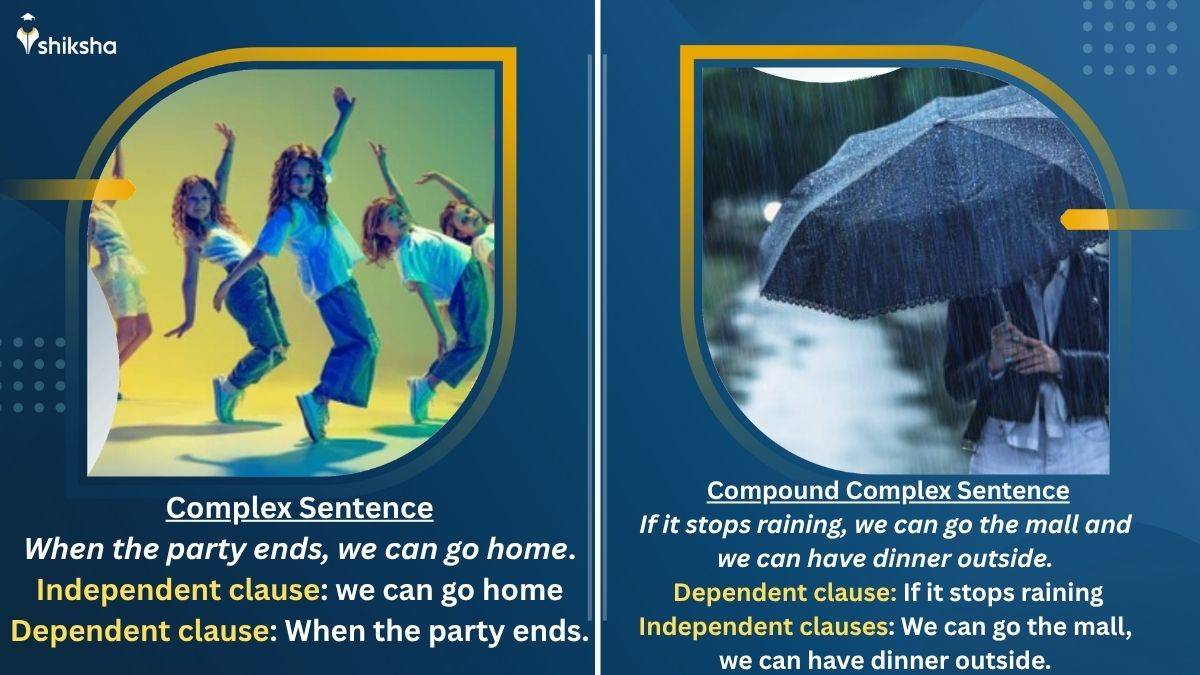
A Complex Sentence is a combination of an independent clause (which can stand alone as a sentence) with one or more dependent clauses (which cannot stand alone). These clauses are linked using subordinating conjunctions like "because," "although," "while," "since," or relative pronouns like "who," "which," or "that". Unlike Simple Sentences, Complex Sentences are not complete in their thought until both the clauses are used.
Complex Sentences are an integral part of English language. This page will dive deep into meaning, uses, preparation tips, exceptions along with practice questions at the end, on this topic. It will help students understand this type of sentence and use it efficiently.
- What is Complex Sentence?
- Definition of Complex Sentences
- Complex Sentences and Compound Complex Sentences: Know the Difference
- Complex Sentences Rules and Structure
- Exceptions in Complex Sentences
- Preparation Tips To Use Complex Sentences Efficiently
- How to Identify Complex Sentences?
- Complex Sentences: Common Errors to Avoid and How to Fix Them
- Complex Sentences v/s Simple Sentences
- Complex Sentences and Compound Sentences: Difference, When to Use?
- Best Books to Study Complex Sentences
- Complex Sentences Examples
- Complex Sentences Exercises with Answers
- FAQs on Complex Sentences in English
What is Complex Sentence?
In simple language, Complex Sentences are a main thought with extra details, being conveyed.
Its main components are:
- Independent Clause: A group of words containing a subject and verb and expresses a complete thought. Example: The cat is sitting.
- Dependent Clause: A group of words containing a subject and verb but does not express a complete thought. It needs an independent clause for its meaning. Example: "because it was tired."
- Subordinating Conjunctions: These are words like because, although, since, while, if, when, unless, as, after, before, until, even though, that connect the dependent clause to the independent clause and complete the complex sentence. Conjunctions are a crucial part of these sentences.
Let’s take a look at a complex sentence example to understand the components:
"The baby slept because he was tired"
"The baby slept" is the independent clause.
"because he was tired" is the dependent clause.
"because" is the subordinating conjunction.
Also Read:
Definition of Complex Sentences
A complex sentence, according to the Oxford Learner's Dictionaries, is “a sentence that contains one main clause (also known as an independent clause) and at least one subordinate clause (also known as a dependent clause). These clauses are connected using subordinating conjunctions or relative pronouns.”
According to the Collins Dictionary, a complex sentence is defined as “a sentence containing at least one main clause and one subordinate clause.” The Macmillan Dictionary defines a complex sentence as “a sentence consisting of an independent clause and one or more subordinate clauses.”
Cambridge Dictionary says, a complex sentence, “contains one independent clause and one or more subordinate clauses. An independent clause can stand alone as a complete sentence, while a subordinate clause relies on the independent clause for its meaning and is introduced by a subordinating conjunction.”
The pronunciation of "complex sentence" in British English is /ˌkɒm.pleks ˈsen.təns/ and in American English is /ˌkɑːm.pleks ˈsen.təns/.
Also Read:
Complex Sentences and Compound Complex Sentences: Know the Difference
When a sentence contains one or more Dependent clauses along with multiple independent clauses, it becomes Compound Complex Sentences.
Remember, the complex sentence only has one independent clause and one or more dependent clauses.
Let’s have a look at some examples for better understanding.
| Examples of Complex Sentences |
Examples of Compound Complex Sentences |
|---|---|
| When the party ends, we can go home. Independent clause: we can go home Dependent clause: When the party ends |
Because it was raining, the children stayed inside, and they played board games. Dependent clause: Because it was raining Independent clauses: the children stayed inside, when they played board games |
| She enjoys playing the guitar, which her dad gifted her. Independent clause: She enjoys playing the guitar Dependent clause: which her dad gifted her. |
Although she was sick, she finished her work, and then she went to bed. Dependent clause: Although she was sick Independent clauses: she finished her work, then she went to bed. |
| If you study hard, you will score well in the exam. Independent clause: you will score well in the exam. Dependent clause: If you study hard |
If it stops raining, we can go the mall and we can have dinner outside. Dependent clause: If it stops raining Independent clauses: We can go the mall, we can have dinner outside. |
Complex Sentences Rules and Structure
Students need to follow below mentioned rules to use complex sentences in English grammar.
All the Elements
Make sure all the elements including dependent clause, independent clause and conjunctions are there in the sentence to make it complete. In case, one of the components is missing, the sentence meaning and context will be incomplete. For example:
- When the movie ends, (incomplete)
- When the movie ends, we will go out for dinner. (complete)
Comma Usage
If the dependent clause comes before the independent clause, use a comma after it. If the independent clause comes first, a comma is generally not needed before the dependent clause. If the placement of comma is not right, it can lead to errors and misunderstanding of the context. For example:
- She is wearing the same red dress her dad gifted her. (incorrect)
- She is wearing the same red dress, which her dad gifted her. (correct)
- You will win the game, if you work hard. (incorrect)
- You will win the game if you work hard. (correct)
Relative Clauses
Use Relative clauses (a type of dependent clause) often begin with relative pronouns like "who," "which," or "that", wherever needed. They are used to add extra information about a noun or pronoun in the main clause. For example:
- The book, which I borrowed from the library, is very interesting.
- The man who lives next door is a cricketer.
Dependent Clause Placement
Dependent clauses can be placed at the beginning, middle, or end of a complex sentence. The placement depends on the thought that is expressed and the structure that is being followed for the sentence. In this case, punctuation too plays an important role. For example:
- Because it is cold, I took out my jacket.
- The baby, because he was hungry, started crying loudly.
- I went to the park after I finished my work.
Let’s take a look at the structure of the complex sentences:
- A complex sentence is made up of a main clause and a subordinate clause connected to each other with a subordinating conjunction.
- Usually the sentence starts with a dependent clause followed by independent clause, separated by a comma. However, as mentioned before, Dependent clauses can be placed at the beginning, middle, or end of a complex sentence.
- Connect dependent and independent clauses with conjunctions or relative pronouns, as per needed.
Examples:
- The novel that I borrowed from my friend is very interesting.
Explanation: The dependent clause "that I borrowed from my friend" modifies the independent clause "The novel is very interesting"
- Although she was tired, she finished her work.
Explanation: The dependent clause "Although she was tired" modifies the independent clause "she finished her work".
Also Read:
Exceptions in Complex Sentences
While Complex sentences are generally straightforward in structure, they still have exceptions when it comes to the usage of comma. Let’s talk about it in detail.
Comma Placement
When a complex sentence begins with a dependent clause, a comma is typically used to separate the dependent clause from the independent clause. If the comma is not used, the meaning of the sentence is not clear. When an independent clause comes first, a comma is usually not needed before the dependent clause. For Example:
- Because it was raining the plan was canceled. (incorrect)
- Because it was raining, the plan was canceled. (correct)
- The plan was canceled, because it was raining. (incorrect)
- The plan was canceled because it was raining. (correct)
Conjunctions
Certain conjunctions like "although," "even though," and "even if" may require a comma before them even when the independent clause comes first, particularly when the clauses express strong contrast or emphasis. For Example:
- She enjoys swimming although she prefers badminton (incorrect)
- She enjoys swimming, although she prefers badminton. (correct)
- She will get late even if she tries to finish her work quickly. (incorrect)
- She will get late, even if she tries to finish her work quickly. (correct)
Comma to Avoid Confusion
Sometimes, a comma is added even in cases when it is not needed grammatically, but to improve readability or avoid confusions. This is a special case where again the punctuation plays a vital role in conveying the sentence message. For example:
- He will come and finish the work, once he gets free.
- I will get the dinner, once my work is done.
Also Read:
Preparation Tips To Use Complex Sentences Efficiently
Students can follow bellowed mentioned simple tips to effectively and rightly use complex sentences in English:
- Understand the sentence structure. Every sentence needs to have a dependent clause, independent clause and a conjunction, to be correct and complete.
- Use the right punctuation as per the requirement. Placement of comma is very important in complex sentences.
- Practice writing complex sentences to solidify your understanding. You can write articles, paragraphs, letters or journals, on any topics, to ace the usage of complex sentences.
- Read a lot. Explore different examples. This will enhance your understanding, clarity and use of sentences.
- Listen to native speakers and focus on the usage and complex sentence structure.
- Use online resources for practice and build better understanding on the topic. These resources explain complex sentence structures and use cases in detail.
Also Read:
How to Identify Complex Sentences?
The quick and easy way to identify Complex sentences in English language is as follows:
- Identify the clause that contains the dependent clause.
- Make sure the remaining part of the sentence forms a complete thought. That will be the independent clause.
- Look for a subordinating conjunction that connect dependent and independent clauses.
Examples:
After you work is done/join us at the restaurant for the dinner.
Dependent clause/Independent clause
Although she was tired/but/she went for shopping.
Dependent clause/conjunction/Independent clause
Also Read:
Analogy In English: Meaning and Examples
Complex Sentences: Common Errors to Avoid and How to Fix Them
Complex Sentences v/s Simple Sentences
Complex Sentences and Compound Sentences: Difference, When to Use?
Best Books to Study Complex Sentences
Complex Sentences Examples
Complex Sentences Exercises with Answers
FAQs on Complex Sentences in English
Commonly asked questions
What are the types of sentences based on structure in English?
Sentence Types Based on Structure
Sentence Type | Description | Examples |
Simple Sentence | Contains one independent clause which is a group of words with a subject and a verb that expresses a complete thought.
| · She is reading a book. · Birds are flying in the sky.
|
Compound Sentence | Contains two or more independent clauses joined by a coordinating conjunction like "and," "but," "or", or a semicolon. | · The dog ran and the CAT climbed the tree. · I finished my work and went for a walk. |
Complex Sentence | Has one independent clause and at least one dependent clause which cannot stand alone as a sentence. | · Because it was raining, I cancelled my movie plan. · After the show got over, they went out for dinner. |
Compound-Complex Sentence | Contains two or more independent clauses and at least one dependent clause. | · After it stopped raining, the sun came out, and we went out for lunch. · Although the place is far, I still liked it and would recommend it to my friends. |
What are Complex sentences?
A Complex Sentence is a combination of an independent clause (which can stand alone as a sentence) with one or more dependent clauses (which cannot stand alone). These clauses are linked using subordinating conjunctions like "because," "although," "while," "since," or relative pronouns like "who," "which," or "that". Unlike Simple Sentences, Complex Sentences are not complete in their thought until both the clauses are used.
How is complex and compound Complex sentences different from each other?
When a sentence contains one or more Dependent clauses along with multiple independent clauses, it becomes Compound Complex Sentences. Ex: Because it was raining, the children stayed inside, and they played board games.
Remember, the complex sentence only has one independent clause and one or more dependent clauses. Ex: When the party ends, we can go home.
What are the tips to prepare for Complex sentences in English?
· Understand the sentence structure. Every sentence needs to have a dependent clause, independent clause and a conjunction, to be correct and complete.
· Use the right punctuation as per the requirement.
· Practice writing complex sentences to solidify your understanding.
· Read a lot. Explore different examples. This will enhance your understanding, clarity and use of sentences.
· Listen to native speakers and focus on the usage and complex sentence structure.
· Use online resources for practice and build better understanding on the topic.
Please state some examples of Complex sentences.
Following are the examples of complex sentences:
After you work is done/join us at the restaurant for the dinner.
Dependent clause/Independent clause
Although she was tired/but/she went for shopping.
Dependent clause/conjunction/Independent clause
Because/ it was hot/we did not go out.
Subordinating conjunction/ Dependent clause/ Independent clause
What are the best books to study Complex sentences?
Students can refer to the following books to study and understand the topic of complex sentences in English:
Books | Author |
Simple, Compound & Complex Sentences | Aamir Shaikh |
"English Grammar Revision B1: 120 Sentence Transformation Exercises" | Jacqueline Melvin |
Diagramming Complex Sentences: A visual Approach to English Grammar | Chandrasekar, Mira Saraswathi, A, Ramachandran |
English Sentences Exam
Student Forum
Other Class 10th English Chapters
- English Past Tense
- English Idioms
- English Punctuation
- English Analogy
- English Interjections
- English Prefixes
- English Adjectives
- English Future Continuous Tense
- English Letter Writing
- English Suffix
- English Grammar
- English One Word Substitution
- English Mood
- English Direct and Indirect Speech
- English Figures of Speech
- English Composition
- English Para Jumbles
- English Reading Comprehension
- English Sentences
- English Auxiliary and Modal Verbs
- English Formation of Words
- English Precis Writing
- English Nouns
- English Adverbs
- Conjunctions
- English Prepositions
- English Verbs
- English Paraphrasing
- English Articles
- English Subject and Predicate
- English Pronouns
- English Tenses
- English Active and Passive Voice
- English Vocabulary
- English Subject Verb Agreement
- English Phrases
- English Synonyms
- English Etymology and Roots
- English Spelling Rules
- English Parts of Speech
- English Gerunds



